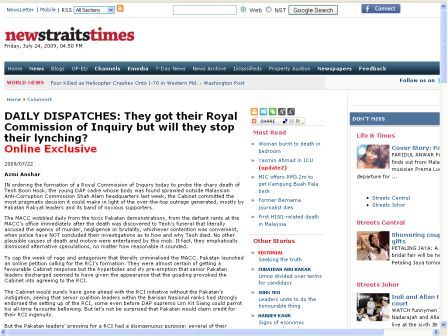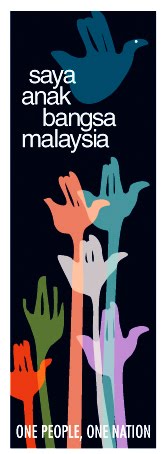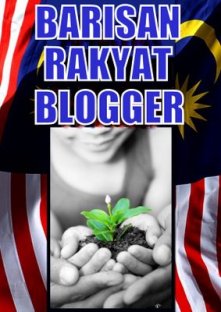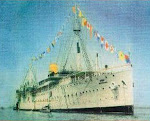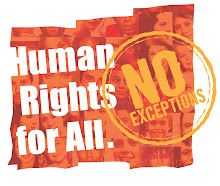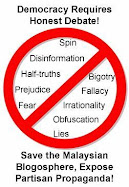
Irregardless of whether it is based on the truth or not, the article, headlined "Takdir Yasmin", breached not only the journalist's code of ethics, but standards of human decency as well.
Since a journalist's first obligation is to seek truth and report it, why is this article in Kosmo! a breach of journalistic ethics? Because even if it is true, it violates another principle that journalists are obliged to uphold:
Minimize Harm - Ethical journalists treat sources, subjects and colleagues as human beings deserving of respect.
- Show compassion for those who may be affected adversely by news coverage. Use special sensitivity when dealing with children and inexperienced sources or subjects.
- Be sensitive when seeking or using interviews or photographs of those affected by tragedy or grief.
- Recognize that gathering and reporting information may cause harm or discomfort. Pursuit of the news is not a license for arrogance.
- Recognize that private people have a greater right to control information about themselves than do public officials and others who seek power, influence or attention. Only an overriding public need can justify intrusion into anyone’s privacy.
- Show good taste. Avoid pandering to lurid curiosity.
- Be cautious about identifying juvenile suspects or victims of sex crimes.
- Be judicious about naming criminal suspects before the formal filing of charges.
- Balance a criminal suspect’s fair trial rights with the public’s right to be informed.
In the case of Kosmo's article, the people behind it have violated this principle in at least four ways:
- They have treated the memory of their subject, a recently deceased person no longer able to tell her side of the story, with disrespect, making allegations that may (given prevailing societal attitudes, prejudiced though they may be) diminish how she is remembered by Malaysians, and expose her family to odium.
- They showed little compassion to her family and scant regard for the potential harm to her aged and frail mother.
- They did not demonstrate any overriding public need that could have justified such an intrusion into their grief and privacy.
- The mode in which they presented their report suggests that they have pandered to lurid curiosity, perhaps motivated by the need to sell newspapers.
All of us will be held to account for everything we write, before the One who reads and edits us all. In the meantime, Kosmo and its journalists involved with this article are accountable to us, their readers and colleagues. Let us make it clear to them that we will not stand by to see ethics breached.
Is their story true or false? I wholeheartedly second blogger Kama's wise words, words worthy of repeating and remembering (from here):
"...Yasmin has gone to meet her Maker. Our time will come soon. Seharusnya kita sadaqah Al-fatihah untuk arwah Yasmin and not go into this silly polemic about her gender. May her soul be placed among the blessed. Amin."Now, may I pose this question, not to Kosmo!, but to all of us who are outraged by Kosmo's article:
First let's see what the principles of ethical journalism that we are bound to uphold are (adapted from the Society of Professional Journalists' Code of Ethics):
The duty of the journalist is to further public enlightenment as the forerunner of justice and the foundation of democracy, by seeking truth and providing a fair and comprehensive account of events and issues. Conscientious journalists from all media and specialties strive to serve the public with thoroughness and honesty. Professional integrity is the cornerstone of a journalist's credibility. Journalists should:
1. Seek Truth and Report It - Journalists should be honest, fair and courageous in gathering, reporting and interpreting information.
2. Minimize Harm - Ethical journalists treat sources, subjects and colleagues as human beings deserving of respect.
3. Act Independently - Journalists should be free of obligation to any interest other than the public's right to know. [Advocacy journalists may of course intentionally and transparently adopt a non-objective viewpoint.]
4. Be Accountable - Journalists are accountable to their readers, listeners, viewers and each other.
The letter to Tan Sri Hashim begins "July 27th, 2009 marked the darkest day in Malaysian journalistic history yet." In the light of the above, haven't there been days in Malaysian journalistic history just as dark as 27/7/09?
How about in the days just before the 1990 general elections, when "then opposition politician Tengku Razaleigh Hamzah was depicted as selling out Muslim interests to Christians merely because he was photographed wearing ethnic Kadazan cultural headgear on which was a symbol resembling a cross. The photograph was splashed in the media and Razaleigh had little chance to counter the allegations". Utusan Melayu published the picture for three days, and Berita Harian's headline on May 19, 1990 was "Ku Li Junjung Salib".
How about something more recent, just eight days ago (22/07/09), when Pakatan Rakyat's position regarding the Royal Commission of Inquiry into the death of Teoh Beng Hock was grossly misrepresented in the pages of the New Straits Times?
Why do we not speak up and act against journalistic misconduct by all news outlets (including our own)? Why are we being selective? Surely our professional ethics apply equally to all, no matter what the victims' (and perpetrators') station in life is? Or is it just a case of double standards and whose ox is being gored?
So, let me put the question back to all the journalists who are rightly outraged at Kosmo: How much of our personal honour are we willing to part with in order to increase our circulation (prospects, promotions, popularity, etc.)?
In other words, when our Editor reads us, will He find us fit to print, or fit to spike?
Lest we be found wanting, we must be mindful of what we ourselves and our colleagues write. For the sake of our integrity, we must speak and act whenever and wherever we see journalistic ethics being compromised, and we must do so in spite of our political beliefs and personal interests. Let's uphold the kind of journalism that this country so desperately needs.
Sincerely,
Malaysian Heart
You can download a printable copy of the Society of Professional Journalists' Code of Ethics in full here (in PDF format).
(I am a member of Hartal MSM, a mediawatch group which had its beginnings in December 2007 in The People's Parliament, an initiative convened by civil rights lawyer Haris Ibrahim. The group seeks to promote a free and fair media as an impetus to Malaysia's stalled nation-building process. The views expressed here are solely my own)
